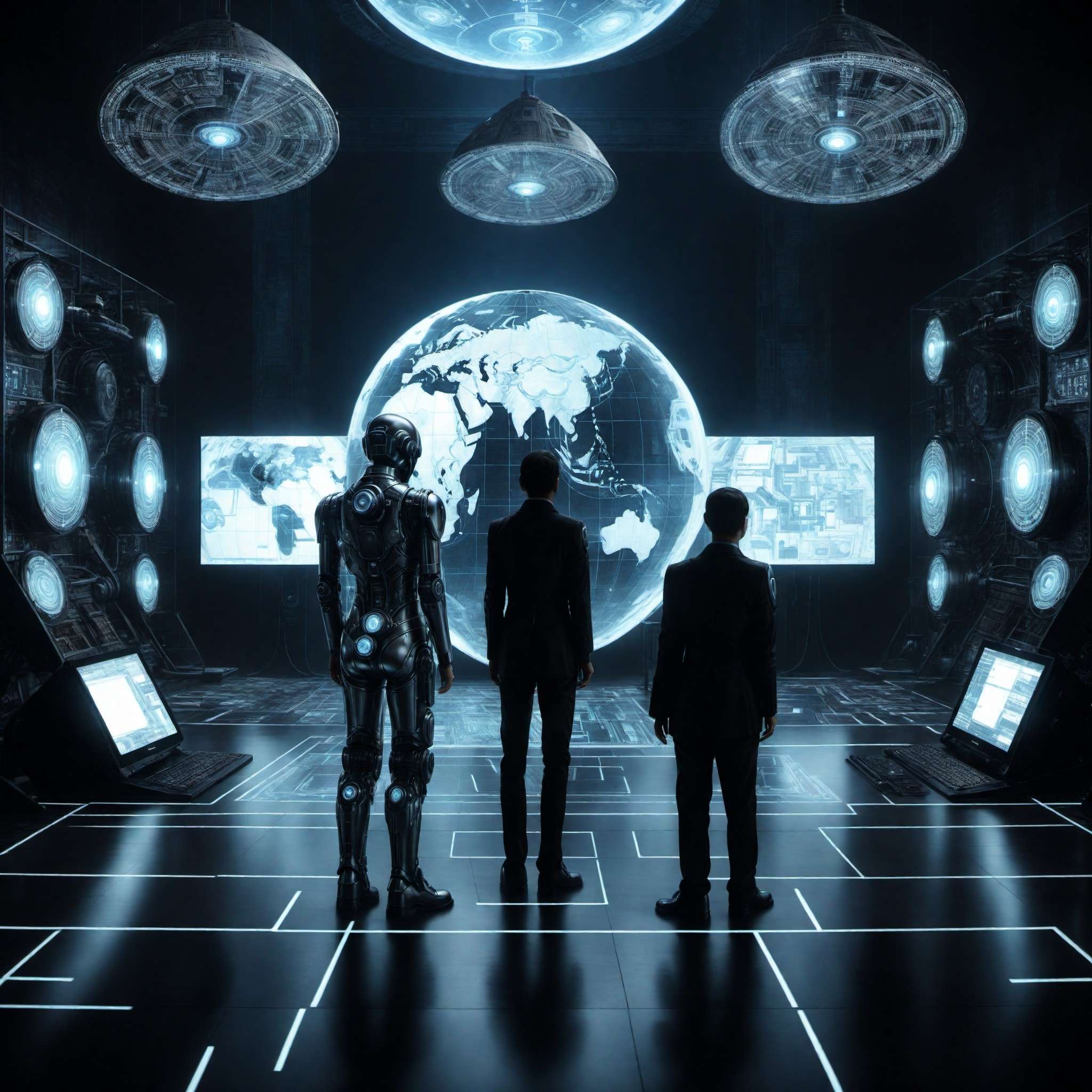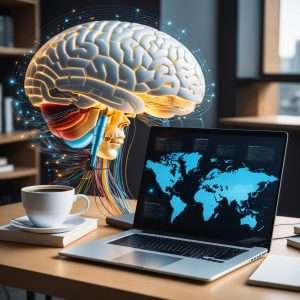Zombie Bunny is Reader-supported and may earn an affiliate commission through links on our site.

The AI Takeover: Myth or Imminent Reality?
Discover the transformative impact of Artificial Intelligence (AI) in our daily lives, from digital assistants to revolutionizing industries like healthcare and finance. This blog post explores the AI narrative, separating fact from fiction and dispelling misconceptions. Join us in shaping the future of AI! #AI #technology
Explore the transformative impact and potential of Artificial Intelligence (AI) in our day-to-day lives, from powering digital assistants to revolutionizing industries such as healthcare and finance. This blog post delves deep into the AI narrative, separating fact from fiction and dispelling common misconceptions about AI’s capabilities. It underscores the potential of AI as a tool designed by humans, for humans, to augment human capabilities rather than replace them. This discussion also highlights the importance of understanding AI’s implications on society and the economy, inviting readers to actively participate in shaping the future of AI. Join us as we navigate the trajectory of AI development, debunk AI myths, and steer the direction of AI towards optimal societal benefit.
Introduction: Setting the Stage for AI Discussion

© Copyright , ZombieBunny.Org
The growing influence of AI in daily life
Artificial Intelligence (AI) has steadily permeated our everyday lives, becoming a pivotal force in shaping modern society. This influence extends from our personal lives, where AI powers digital assistants like Siri and Alexa, to our professional spheres, where it assists in data analysis and decision making. The omnipresence of AI is notable, with its applications ranging from predictive text and voice recognition to advanced security systems and autonomous vehicles.
Moreover, AI is revolutionizing sectors like healthcare and finance by enabling personalized recommendations and predictive analytics. Its footprint in entertainment through algorithm-driven recommendations on platforms like Netflix and YouTube is another testament to its expansive reach. As AI continues to evolve and mature, its influence is projected to grow, intensifying its role and impact in our daily routines. The AI takeover isn’t an overnight revolution, but a gradual evolution, subtly yet definitively transforming our world.
Common perceptions of AI and its potential
Common perceptions of Artificial Intelligence (AI) are often a blend of awe, anticipation, and fear, shaped by a mix of scientific facts, media representations, and popular culture. On one end, there’s an optimistic view of AI as a transformative force with limitless potential to advance society. This perspective sees AI as a tool for tackling complex challenges, from climate change to disease eradication.
On the other end of the spectrum, there’s apprehension about AI’s potential to surpass human intelligence, with dystopian predictions about job displacement and loss of control. This perception often stems from a misunderstanding of AI’s capabilities and limitations. In reality, AI is a tool designed by humans, for humans. Its potential lies in augmenting human capabilities, not replacing them. As we delve deeper into the AI takeover narrative, it’s essential to separate the sensational from the factual, and the myth from the imminent reality.
Purpose of the ensuing discussion on AI takeover
The purpose of this discourse on the AI takeover is to foster a constructive conversation, dispelling misconceptions and illuminating the true nature and potential of AI. It serves to bridge the gap between the widespread narratives of AI, which often oscillate between utopian visions and dystopian fears, and the actual scientific understanding of AI’s capabilities. This discussion aims to provide a balanced perspective, elucidating both the opportunities AI presents and the challenges it poses.
Moreover, this dialogue is designed to empower readers with knowledge, enabling them to actively participate in shaping the future of AI. By understanding AI’s implications on society and economy, we can collectively influence its development and ensure it aligns with human values and interests. Ultimately, this conversation about the AI takeover isn’t merely about dissecting a future scenario, but about steering the direction of AI towards optimal societal benefit.
A Historical Perspective: AI in the Making

© Copyright , ZombieBunny.Org
The birth and evolution of Artificial Intelligence
Artificial Intelligence (AI) has a rich and varied history, its roots traceable to the mid-20th century. The term ‘Artificial Intelligence’ was first coined in 1956 at the Dartmouth Conference, marking the birth of AI as an independent discipline. Early AI research focused on problem-solving and symbolic methods, leading to the development of systems capable of basic tasks.
The next significant phase, often referred to as the ‘AI Winter,’ was marked by reduced funding and skepticism towards AI’s potential due to its inability to meet inflated expectations. However, AI experienced a resurgence with the advent of the internet and advancements in computational power and data availability. Machine learning and neural networks gave rise to more sophisticated AI applications, from speech recognition to autonomous vehicles. The evolution of AI serves as a testament to human ingenuity, and this trajectory continues to ascend as we venture into the era of AI dominance.
Key milestones in AI development
Several key milestones punctuate the timeline of AI development, reflecting the progression of AI from a concept to a transformative technology. In the 1950s and 60s, AI research focused on symbolic systems and rule-based methods, leading to the development of the first AI programs that could mimic basic human intelligence.
A significant milestone was the introduction of machine learning in the 1980s, which shifted the paradigm from rules-based AI to AI capable of learning from data. This marked the beginning of AI’s ability to adapt and improve over time. The advent of deep learning in the 2000s further propelled AI capabilities, enabling AI systems to process vast amounts of data and perform complex tasks. More recent milestones include the victory of AI system AlphaGo over a human champion in the complex game of Go, demonstrating AI’s capacity for strategic thinking and problem solving. These landmarks in AI development signify the steady march towards a future where AI is an integral part of our lives.
The present state of AI against historical backdrop
Against the rich tapestry of its historical backdrop, the present state of Artificial Intelligence (AI) is both impressive and promising. Today, AI is not just a theoretical concept but an operational technology, driving advancements across industries and facets of daily life. Machine learning and deep learning, once nascent ideas, now form the backbone of contemporary AI, powering applications from voice assistants to predictive analytics.
However, it’s essential to understand that today’s AI is still narrow or weak AI, excelling at specific tasks but lacking human-like general intelligence. Despite significant strides, we are yet to achieve Strong AI or Artificial General Intelligence (AGI), which can perform any intellectual task a human being can. The journey from the initial conception of AI to its current state has been transformative, and this evolution continues. As we stand on this juncture of AI history, the future holds immense possibilities and challenges to navigate.
Interpreting the AI Takeover: Myths & Misunderstandings

© Copyright , ZombieBunny.Org
Debunking the myths surrounding AI takeover
The narrative surrounding an AI takeover is often steeped in myths and misunderstandings. One such myth is the fear of AI replacing humans in all aspects of life. In reality, AI is designed to augment human capabilities, not replace them. While AI can automate routine tasks, it lacks the emotional intelligence, creativity, and critical thinking inherent to humans.
Another pervasive myth is that AI will become uncontrollable, leading to a dystopian future. However, AI is a tool created by humans, and its development and use are subject to human control and ethical guidelines. It’s crucial to understand that AI operates within the parameters set by its human creators.
Lastly, the idea that AI will lead to widespread job loss overlooks the potential for AI to create new jobs and industries, just as technological advancements have done throughout history. By debunking these myths, we can approach the AI takeover narrative with a balanced and informed perspective.
Explaining the misconceptions about AI capabilities
Misconceptions about Artificial Intelligence (AI) capabilities often stem from a misunderstanding of what AI is and what it can do. One common misconception is that AI can think and make decisions like a human. In reality, AI can analyze data and make predictions based on patterns, but it doesn’t possess human-like consciousness or decision-making abilities.
Another misconception is that AI is infallible. While AI can process and analyze vast amounts of data with speed and accuracy, it’s not immune to errors. The quality of AI’s output largely depends on the quality and diversity of the input data. Bias in data can lead to biased AI outcomes.
Additionally, the notion that AI can solve all problems overlooks the fact that AI is a tool. Its effectiveness depends on how it’s used. Understanding the true capabilities of AI allows us to harness its potential effectively, without overestimating or underestimating its power.
The reality behind sensationalised AI fears
Sensationalized fears about Artificial Intelligence (AI) often paint a picture of a dystopian future, driven by AI’s supposed threat to human supremacy. These fears are largely based on a misunderstanding of AI’s nature and capabilities. The reality is that AI is a tool designed to augment human capabilities, not supersede them.
The fear of AI leading to mass job displacement overlooks the potential for AI to create new jobs, just as technologies have done throughout history. While AI can automate routine tasks, roles requiring creativity, empathy, and human judgment will continue to need human involvement.
Concerns about AI becoming uncontrollable hinge on the misconception that AI has a will of its own. In reality, AI operates within the parameters set by its human creators. By understanding the true nature of AI, we can navigate the future with informed optimism rather than undue fear.
The Future of AI: Potential & Possibilities

© Copyright , ZombieBunny.Org
Potential positive impacts of AI on society
Artificial Intelligence (AI) holds immense potential to positively impact society. In healthcare, AI can enhance diagnosis accuracy, predict disease outbreaks, and personalize patient care, contributing to better health outcomes. In education, AI can facilitate personalized learning, identify gaps in learning materials, and provide adaptive feedback, enhancing the learning experience.
In terms of environmental sustainability, AI can optimize energy use, predict climate patterns, and monitor deforestation, aiding in the fight against climate change. AI can also revolutionize transportation through autonomous vehicles, improving safety and efficiency.
Moreover, AI can augment human capabilities in the workplace, automating routine tasks and enabling workers to focus on more complex and creative tasks. It can also foster social inclusion by providing assistive technologies for individuals with disabilities. These potential benefits of AI underscore its promise as a tool for societal advancement, underlining the importance of embracing its potential and managing its challenges effectively.
Possible advancements in AI and their implications
The trajectory of Artificial Intelligence (AI) points towards several possible advancements and their implications. The development of AI towards Artificial General Intelligence (AGI), capable of understanding, learning, and applying knowledge across a wide range of tasks, represents a significant potential advancement. AGI could revolutionize problem-solving and decision-making, but also raises ethical and societal questions about control and responsibility.
Another potential advancement is the integration of AI with other technologies like quantum computing, which could significantly enhance AI’s data processing capabilities. This could enable more complex and accurate modeling of phenomena, from climate systems to financial markets, but also necessitates robust data privacy and security measures.
Moreover, the development of AI ethics and regulation is a vital aspect of AI’s future. Ensuring AI’s alignment with human values and societal goals is crucial to harnessing its benefits. The future of AI is not just about technological advancements, but also about navigating their implications responsibly.
Preparing for the potential future with AI
As we stand on the cusp of a future shaped significantly by Artificial Intelligence (AI), it’s imperative to prepare effectively. This preparation involves fostering digital literacy and AI education, equipping current and future generations with the skills to engage with AI responsibly and productively.
Emphasizing ethical AI development and use is another key aspect, ensuring that AI technologies align with human values and societal goals. This involves establishing robust ethical frameworks and regulatory standards for AI.
Furthermore, preparing for a future with AI also involves fostering an inclusive dialogue about AI’s implications. This includes diverse stakeholders – from policymakers and technologists to educators and the public – to ensure a broad-based understanding and consensus on AI’s role in society.
Finally, foresight and flexibility are crucial given the evolving nature of AI. As we navigate towards an AI-augmented future, continuous learning and adaptation will be key to harnessing AI’s potential effectively.
Conclusion: Deciphering the AI Takeover Narrative

© Copyright , ZombieBunny.Org
Summing up the AI takeover debate
As we’ve navigated the landscape of the AI takeover narrative, it’s clear that this topic is complex and multi-faceted. Rather than a binary of myth versus reality, the AI takeover debate is a spectrum of possibilities and challenges. AI’s growing influence in our daily lives, its evolution, and its potential future implications all contribute to this nuanced narrative.
While fears and misconceptions about AI are widespread, it’s crucial to separate these from the realities of AI’s capabilities and limitations. AI is a tool designed to augment human capabilities, not replace them, and its development and use are subject to human control and ethical guidelines.
The potential of AI to transform society is immense, but it’s important to navigate this potential with an informed and balanced perspective. The AI takeover narrative isn’t about fearing AI, but about understanding it, guiding its development, and harnessing its potential responsibly.
The importance of informed discussions about AI
Informed discussions about Artificial Intelligence (AI) are pivotal in shaping the trajectory of AI development and its societal impact. These conversations foster a shared understanding of AI, debunking myths and clarifying misconceptions. They help elucidate AI’s capabilities and limitations, enabling us to harness its potential effectively and mitigate its risks.
Informed discussions about AI also facilitate the development of ethical guidelines and regulatory standards for AI. They enable diverse stakeholders, from policymakers and technologists to educators and the public, to contribute to the AI narrative, fostering inclusive and democratic decision-making about AI’s role in society.
Importantly, these discussions also inspire innovation and progress in AI. By fostering an open dialogue about AI, we can collectively navigate the challenges and opportunities it presents, steering the course of AI development towards beneficial outcomes. In the context of the AI takeover narrative, informed discussions are not just beneficial, they are essential.
Final reflections and call to action
Reflecting on the AI takeover narrative, it’s clear that AI is a transformative force with the potential to shape our future significantly. However, it’s also evident that the perception of an AI takeover is often clouded by myths and misconceptions. As we move forward in the AI era, it’s crucial to approach the topic with a balanced and informed perspective, distinguishing between the sensational and the factual.
This brings us to a call to action. As individuals and as a society, we must engage in the AI dialogue, educate ourselves about AI, and contribute to the shaping of AI policies and practices. It’s our collective responsibility to ensure that AI development aligns with human values and societal goals, harnessing AI’s potential while mitigating its risks. As we stand on the cusp of an AI-augmented future, let’s commit to guiding the course of AI towards optimal societal benefit.
Please support our site and purchase something from our store.







